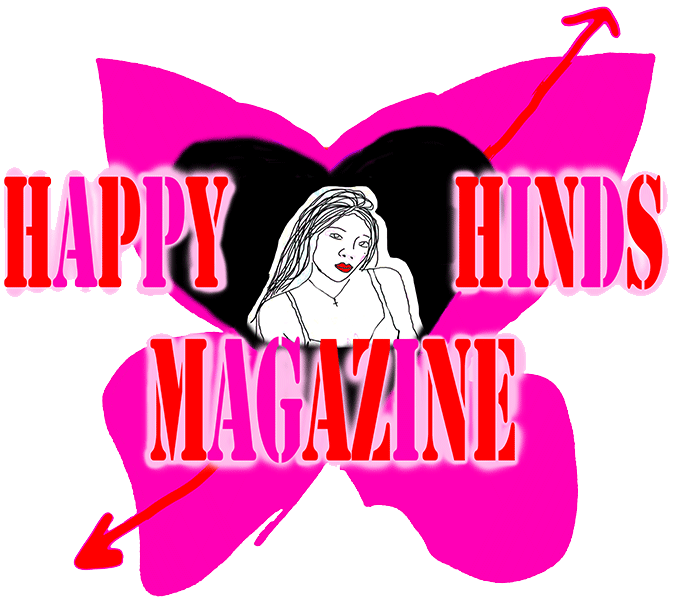
Currently on the rise gaining recognition for her singing, DJ, and acting skills, Zuri Marley takes on a whole new world of music. The stunning 26-year-old scored features in Teen Vogue, Yahoo, Daily Mail, Vice, NY Post, Vogue, and BET at 23. Marley was even featured in a video for Vogue online, showcasing her step-by-step make-up routine. Born in Kingston, she strived to make a name for herself diverging from members of her family such as Ziggy and Bob Marley, and she absolutely has. Within her music career, she took inspiration from musicians such as Likky Li and Lady Gaga, finding herself more in the music scene of electronic. On the 2016 album by Blood Orange, “Freetown Sound”, she also was also recorded singing her too. The world should be so excited to see what Zuri Marley has to do next whether it be on the turntable, or in the studio.
Happy: So, I read that by the age of 23… You’d already been featured in Teen Vogue, Yahoo, Daily Mail, Vice, New York Post, and Vogue… Just to name a few! Did you ever think that you would be as successful as you are today? Or does it all, kind of, come as a shock?
Zuri: eI don’t think I’ve done anything that really gives me a shock factor. But I do feel that anytime something does happen… I take it as an opportunity, and I just try to do my best. When I was featured in the ‘Vogue Beauty Secrets’ video… I felt like, ‘oh, wow, this is really cool!’ I was definitely thinking to myself: ‘I’m surprised that I’m doing this.’ But none of it so far has been shocking, because I’m always just pushing myself to do the next thing. So, yes, I’m super grateful for everything I’ve done, but I’m also very ambitious.
Happy: That’s so incredible. I feel like sometimes when we have accomplishments, we kind of just are looking towards the next thing, whereas other people are seeing how much progress we’ve made, which I have of course seen for you!

Zuri: I mean, it’s also so easy to compare what you’ve done to where you are now, or vice versa. So I think that’s something that I always work on… Just trying to know that I’ve accomplished things and I can still accomplish things. You just have to, kind of, stay on the course completely.
Happy: That’s an amazing way to think about it, and I feel like that way of thinking has allowed you to have even more of a sense of freedom within the things you do.
Zuri: Definitely. Very free.
Happy: So you were born in Kingston, Jamaica, which I think is super iconic. I imagine that the culture there is very different from the culture in America. What were things that shocked you when you moved from Jamaica to America? And have you become more comfortable with those things now?
Zuri: Gosh, what has shocked me? Socially, people are less blunt here. People in Jamaica are very blunt. They tell it like it is. People are just I don’t know, I think I grew up with a certain tough love or, like, people just aren’t as sensitive, even though it does exist like people do. Obviously, humans are sensitive, but in Jamaica, that wasn’t, like, something that I really was fully aware of, just because people are very open. So that’s something that I had to adjust, even in the way I speak and stuff like that. But I really have gotten accustomed to the state. There are certain things that still I’m just like the flow of certain things. Like, Jamaica is so relaxed, and we’re just a smaller country, so we don’t have some of the problems. We have very different problems, but some of the problems here are just so different to what we deal with there. That was something to get used to, too, and just, like, how people socialize. There’s so many different things. But I think I’ve been here for a little bit now, and I’m like, okay, yeah, I get it. And there’s a lot of pros that come with living in the States and cons, but there’s a lot of pros, so I’m used to it, I’d say.
Happy: I love that. That’s incredible. I feel like to be able to adjust and kind of, find peace wherever you are is so cool.
Zuri: Yeah, Lana [Del Rey] said it. Many people have said it. My mother has actually said ‘it’ to me… “Wherever you go, there you are.” So you kind of have to figure it out. It’s not always the environment. Sometimes, it’s doing the inner work to be comfortable with yourself where you are. Like, you can move, and yeah, there might be something there that makes you feel better. But at the end of the day, you only have yourself, so you kind of have to learn how to be comfortable with that.

Happy: That’s amazing. So you released your first single, Beg For It, in 2017, which is a song that I totally was and am obsessed with. You are so talented. Do you have a goal for yourself in relation to your music? Like, what is the end all, be all?
Zuri: Yeah. Well, I definitely want to release more. It’s such a hard industry. Every industry is hard, honestly. Like, working, living, being here on the planet can be really hard sometimes. So I’m definitely working on releasing more music. Hopefully this year, maybe next early next year. But I’m always making things. I’ve never stopped making things, and I think sharing them with everyone is something that I want to get better at. I guess the end goal would just be to make people feel something. To make people feel like they can relate. I feel like I use music to comfort me, and I like being comforted by it, so I hope people would be comforted by something I make or whatever it makes them feel. I don’t know. But that’s a goal.
Happy: That’s amazing. That’s a very sweet goal. That’s so cool, because when you ask is someone that, most of the time the answer is very different from yours. It’s not so much based on the comfort of people that are listening. So I think that’s very cool.
Zuri: I feel like prepandemic, I might have had a different answer, but with where the world is at now… We need to just be really aware of each other and the planet and just… Take care. So I think that’s why probably my perspective has changed on my goals.
Happy: Right. That’s super awesome. I feel like Covid was obviously such a moment for all of us, and finding out the ways that it affected different people is so interesting.
Zuri: It certainly affected us all.
Happy: That it did. So something I think is so compelling, and I think I’m sure everyone else does, is that Bob Marley is your grandfather. So how has that been for you? And are there things that might possibly have been harder because of it, or do you feel it’s been the opposite?
Zuri: Well, I see all these things on TikTok about nepotism babies and nepotism in general and how your proximity to certain things gives you opportunities, and I think there’s definitely truth to that. But I also think that nepotism, I think people, like, at least today, they’re really looking at it in terms of celebrity.
Happy: What do you mean by that?
Zuri: Nepotism can happen just, like, if you have money or if you have any type of position of power. So, for me, I think it’s helped in a lot of ways. I never want to say it’s hurt, but I think that nepotism isn’t something that’s really big in my family. I don’t think it’s really big in Jamaican culture either. I don’t know if it’s even really big in black culture. I want to see more nepotism in black culture, actually. But yeah. I don’t know. I feel like, again, growing up with tough love, everything you have to work for, and you kind of pave your own way.
Happy: I agree with a lot of that.
Happy: There’s people who care about my last name, and there’s people who don’t, and there’s people who have treated me more poorly because of it, which I think is whack. And there’s people who have treated me like something which I also think is whack. There’s definitely a level of respect, I think, that is warranted for what my family has done and the message that has been sent through my grandfather’s music. But I also think that it’s super important to just treat everybody equally. I think I’ve had, like the playing field for me has been like this [motions up and down] rather than, like, I’m up here, or I’m down here. It’s always up and down, depending on what room I’m in or what job I’m looking to get or, like, what venue I’m playing at. So it’s been super interesting. I think the most important part for me is just connecting with my grandfather’s music on a deeper level and understanding the message that he wanted to send and carrying that on. In my own way, I think it’s all about being an individual.
Happy: Totally. That’s amazing. And I think that what you’re saying is so correct. Like, it’s either people treat you worse because of it, or they treat you [bursts into laughter].
Zuri: [Laughs] Yeah, you’ve probably definitely dealt with some of that.
Happy: Yeah, I completely have.
Zuri: It’s interesting.
Happy: It totally is. But I love when people talk about it because it’s not that it’s an unpopular opinion, but it’s not something that very many people talk about or are open about in general.
Zuri: Yeah. And I think that something that people always did to me was be like, ‘you think just because your Bob Marley’s granddaughter’ is or insert whatever situation here… Those are just people’s assumptions about or their insecurities about how you might be looking at them or whatever, and this is something that’s coming from their own mind. It’s not actually how you’re behaving all the time. Some people are just uncomfortable with the facts and you can’t really control those people’s reaction to you and your existence. And that goes for people who have a lineage of an important person or just people in everyday life. You can’t control what people think of you, so just keep doing your thing.
Happy: I genuinely think everything you just said is brilliant. Just reminding yourself that everything is perception.

Zuri: Yeah. I think some people can be super blind to their blessings and blind to their privilege and have no perspective, but I think a lot of people do have the perspective. At least I feel like I do. I feel I have that perspective because just how I grew up. I grew up in Jamaica, even though in Jamaica, I was in a privileged position, it’s very different from growing up in LA or wherever. It’s just very different. So I feel like that helped me a lot to be able to have perspective.
Happy: So, in addition to being an actress, you are also an incredible DJ. What is it about DJing that kind of made you want to get in on the fun?
Zuri: Honestly, one of my friends taught me how to do it, and then I kind of just took it on.
Happy: That’s incredible so crazy to find out. You’re like a great DJ.
Zuri: Thank you. I think because of my love for music and just rhythms and all that, I was just able to kind of pick it up and it’s been a great add-on to my career. And actually it’s one of the things that’s been the most lucrative and something that you can actually have a little bit of fun with and control over. Because with acting, with auditioning, you don’t really have control of the outcome. You’re going to wait for someone, or you could write your own stuff or whatever, but there’s always that thought in the back of your head where you have to kind of let go and be like, all right, it’s not my decision, so I do my best and I move on. With DJing, you can plan a little bit more, but also you can react in the moment and you can say, okay, the crowd’s vibing with this. The crowd is doing this, and by the end of it, you kind of know how you did right after the job.
Zuri: So it’s fire. It’s just like, ‘let’s go have fun!’
Happy: I love that. I love that you’re like having fun with it. And that’s so cool that a friend just taught you and now you’re, like, truly an iconic DJ.
Zuri: Yeah, she just taught me how to do it. I love her. Shout out to Priscilla.
Happy: I love that. Well, I’m so glad you’re doing it.
Zuri: Me too. Yeah, it’s something to just keep the wheels turning.
Happy: Yeah, they’re definitely turning!
Zuri: I’m glad you think so.
Happy: I really do. This is the honest truth! So I read about your experience with with hyperthyroidism and how you’ve kind of made a way for it to act as a catapult for growth for you. How has that affected your life and is there anything that you’ve learned from kind of dealing with something that’s not necessarily in your control?
Zuri: Yeah, I think so. I have Hypothyroid and PCOS, which there’s a lot of, like it’s positive Ovarian syndrome. There’s a lot of symptoms that come with it and there’s no real cure. So whenever I was told I would have to take medication for the rest of my life, I was like, ‘that sucks.’ I think a lot of people who don’t have these issues, they see taking medicine as something that you do when you’re much older. But there’s a lot of people who have autoimmune diseases or have some type of situation where they need medication, they need medical attention, they need help, they need things that help them go through their everyday life.
Happy: That is so insightful. I know a lot of people reading this will feel grateful for your honesty.
Zuri: And it’s still a struggle. I don’t feel like I’m even used to it yet, still, after years of dealing with it. But it makes me have to be really on top of my shit, which I’m not always. And I don’t know, I’m always up and down with it because at one point you feel like, ‘oh, my body is betraying me,’ and another point, you’re saying, ‘okay, I might not have control over what’s going on in my body, but I have control of how I deal with it.’ It’s a lot because to really feel good on any given day, I would have to have been doing like a month of acupuncture, being perfect with all my medicines, working out for 30 minutes every day, doing my skincare routine, practicing self care. It’s a lot. Taking all these different medications and supplements at different times in the day and with food. And for some people, that’s super easy. For me, that’s been a struggle. So I think just being gentle with myself is super important. I also go to therapy, which I think is very important. I’m a ‘big therapy supporter.’ I’m like, everybody should do it and don’t give up on it after the first try with someone, because you have to find someone who you really connect with.

Zuri: So, in my head I’ve created my own little wellness team and I have my own little email for all the stuff that goes into my health. That doesn’t mean I always am on top of it. Not at all. But I’m very aware of what I need to be doing and I think that’s the first step. It’s definitely something where you can look at other people and think to yourself, ‘I wish I could just go out every night and feel dandy. But when you do what’s best for you, you’re going to feel ten times better and maybe you’ll be able to do that one day. No real complaints. It’s more just a learning experience.
Happy: You’re so wise. I’m learning so much in this interview. To be honest, I am. And that’s so true. when you do things for yourself, you feel better than you would if you kind of betrayed what you need.
Zuri: it’s just so important for us to realize that and find comfort in community of the things that we are similar on but also the things that we’re different on. It’s okay to be different from each other. It doesn’t make us any better or any worse. We’re just different. And that’s, I think, a good thing.
Happy: Yeah, I think that’s a good thing too. I love that you know all of these things. It’s so great that you’re so wise. You know what I mean? A lot of people, it takes them years and years to learn these things. So to be in the spot that we are in life, for you to be this self aware, it is super impressive.
Zuri: Thanks. It’s so interesting to hear these types of compliments. I think I’ve always been very self aware. Sometimes it’s not a good thing and then other times it’s really helped me.
Happy: Yeah, I understand that. But I feel like it makes you such an honest and comfortable person to talk to, as well.
Zuri: So if you could snap a finger and make absolutely anything a reality, what would you make happen?
Zuri: Oh my gosh. I mean there’s so many things I’m thinking about. I would love to just fix the planet. I don’t want shit to be melting and people to be like dropping down because of the heat and all these things. I don’t want that. I really don’t. I want the planet to be in a better place than it is and I am not doing much about it. I don’t know what to do, but it’s just been on my mind lately. That’s one thing I would do, but there’s so many other things I want to do too. There’s so many more like self serving things I would do.
Happy: What would be like second best thing to do.
Zuri: Oh, my God.
Happy: It’s okay if it’s ‘self serving,’ as you said. I will love it no matter what it is.
Zuri: if I audition for something like, boom, it’s just booked. That would be great. If I could just go to the gym and boom, the weight, it falls off. Things like that. I think everyone feels that; you want the hard thing to just happen overnight.
Zuri: I guess you don’t get to gain the self awareness that we’re talking about if things just happen overnight. You kind of have to learn those lessons maybe even harder after things happen overnight. Because then you’re at a place where you feel like everything should be right, and then it’s not. And then you go even crazier because you’re just like, ‘shouldn’t my life be great now? This great thing has happened to me finally.’ But… I’ll take the journey.
Happy: That makes so much sense. You are taking me to church with this interview. I’m so grateful.
Happy: Something that I personally admire about you is that you seem to be very aware of the fact that body positivity isn’t just a trendy term and it’s actually based on reality and truth and just how things are and should be. I admire this so much because weight does fluctuate and it’s so important to embrace the person you are, regardless of temporary factors in life. So I’m wondering, have you always had wisdom about those things, or is this something that has kind of developed in its own way?
Zuri: I think my relationship with my body has developed in its own way because ever since I was young, I thought I wasn’t at the right size. And then I got older, and then I would grow in certain ways, and I’d think, ”well, now I’m not at the right size.’ And then a year later, I’d say, ‘well, now I’m not at the right size’. And I’d look back at pictures from before and think, ‘well, I was at the right size then. I didn’t think I was at the right size.’ Then I look at people, now, who are maybe like a size bigger than me or a size bigger than me, and I look at their bodies and I think, ‘well they look amazing, but I don’t have those curves, I don’t have that a**.’ There’s so many things that go through my head when it comes to my body. And I do think all bodies are beautiful. I think we really exude that though. If we feel good, then we’ll exude that. But when we feel bad, we look the way we feel.

Happy: I completely understand how being plus sized can feel like it is a body standard in and of itself.
Zuri: It shows how we feel when we feel good at any size, it shows. And I think depression that comes with body dysmorphia or just any body image issues, it can really affect the way that you take care of yourself. I think that’s been one of my biggest issues with self care and how it looks online, it looks very perfect, it looks so clean and it is very inspirational. But in reality, sometimes when you’re sitting in that place that you can’t get out of, you can’t even bring yourself to take care of yourself and then things feel like they’re falling apart and then you look at yourself and you’re just like hating all of it. So I think between growing up and also, like, social media all happening at the same time, it allowed me to develop, I think, a more positive relationship with my body. But also it’s allowed me to understand that if my self care looks different, it’s okay. And you kind of really have to take time with it because my weight fluctuates a lot, especially with Hypothyroid and especially with PCOS and these things going on. And there’s days when I’m just like, I need a burger and I’m going to eat a burger.
Zuri: And honestly, many days are like that. I know it’s not the best thing for me, but I also know that that sometimes is mental strength, right? More than it is physical, more than it is my body doing something. Most of the time I feel like our limitations are mental. So I definitely still am working on the way that I look at my body. But I have also come to really accept certain things about it and know that, like the other day I tried on this dress for a DJ sets I was doing and it was a designer address and in my mind I was thinking, ‘designers don’t make my size.’ Yeah, they do. They do. Now, some, not all, but they do.
Happy: I agree with that. They do.
Zuri: It was Rodarte. I put one of their slip dresses on and I was like, ‘my God, it fits!’ The construction made me look amazing. Made me feel amazing. Even though I have a belly and all these other things, it made me feel great. I think that if a lot of these fast fashion brands and more affordable brands worked on the construction of the garment to make it actually work and be flattering, it would be so good for people’s body image, because that’s half the battle. Your garment can look trash, and then you go to a tailor and it’s like, wait, I’m amazing. Not everyone is that girl who goes to a tailor and does all of that. I’m not that person but I want to be. I pretend to be. Sometimes I try to be but it would be nice if more brands understood that that’s part of it. I’m sure they do. I want to see it more like the construction of the garment just being so flattering. Not just like a bigger size.
Happy: Right. That’s very important. Yes. Because when it’s a bigger size, literally I can’t even get started on this.
Zuri: Yeah, it’s not always right.
Happy: It’s literally just like a cloned bigger version with, like, no real alterations.
Zuri: Right, exactly. So we’re looking for those little alterations that make us feel good.
Happy: So if the world were to end tomorrow, what would you hope people would remember about you?
Zuri: What would they remember about me? That means everyone’s memories would be so different. I don’t know. Oh, my God. What would you remember about me?
Happy: Me?
Zuri: Yeah.
Happy: You’re so funny. What would I remember about you? I remember that you’re really funny. You’re like take no BS person, which is incredible… And you’re super talented. Do you want me to keep going? I can go all day.
Zuri: Stop whenever you’d like. Let me tell you something. That’s what I would want people to remember. Whatever you say, like, whatever they remember, they remember.. I hope I was a pleasure.
Zuri: Not like a downer, but even if I was a downer, I hope it was a pleasure.
Happy: I love that you’re like, ‘it’s just up to perception.’

Zuri: Yeah, it’s up to them. It’s up to the people with the memories. I always think about that with death. It’s like the people who are still living are the ones who create the legacy or the feeling.
Zuri: We will have to do another interview when I know what I want people to remember.






